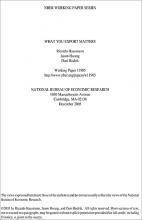-
Challenges of Services Liberalization in the Multilateral and Regional Contexts: The Case of Arab Countries
Ahmed Farouk Ghoneim, Arab NGO Network for Development (ANND) 2012The aim of this study is identifying the challenges facing Arab countries in liberalizing their services sectors, and how to tackle and handle such challenges to ensure positive developmental and welfare gains. Read More
Study -
Aid for Trade at a Glance: Connecting to Value Chains
This joint OECD-WTO publication puts a spotlight on aid for trade to assess what is happening, what is not, and where improvements are needed. The analysis is focused on trends in aid-for-trade policies, programmes and practices. Read More
Study -
The Arab Region and Trade Liberalization Policies: A Look into Sectoral Implications
Kinda Mohamadieh, Joseph Shaw, Julien De France, Arab NGO Network for Development (ANND) 2007This publication is based on the work produced and commissioned by ANND during its two-year project on the socio-economic impact of trade liberalization policies on the Arab region, which was supported by the Ford Foundation. Read More
Report -
World Trade Flows: 1962-2000
Robert C. Feenstra, Robert E. Lipsey, Haiyan Deng, Alyson C. Ma, Hengyong Mo, National Bureau of Economic Research (NBER) 2005We document a set of bilateral trade data by commodity for 1962-2000, which is available from www.nber.org/data (International Trade Data, NBER-UN world trade data). Users must agree not to resell or distribute the data for 1984-2000. The data are organized by the 4-...Read More
Study -
What you Export Matters
Ricardo Hausmann, Jason Hwang, Dani Rodrik, National Bureau Of Economic Research (NBER) 2007When local cost discovery generates knowledge spillovers, specializa- tion patterns become partly indeterminate and the mix of goods that a country produces may have important implications for economic growth. We demonstrate this proposition formally and adduce some...Read More
Study -
Export Superstars
Caroline Freund, Martha Denisse Pierola , The World Bank 2012This paper shows that the top 1 percent of exporters critically shape trade patterns, using firm-level data from 32 countries. In particular, variation in average firm size (the intensive margin) explains over two thirds of the variation in the sector distribution of...Read More
Study -
Estimation of Trade Protection in Middle East and North African Countries
Maria-Angels Oliva, International Monetary Fund (IMF) 2000This paper studies the structure and evolution of trade protection in the Middle East and North Africa (MENA) countries in the 1990s. Read More
Study -
Analysis of NTBs in Euro-Med Zone
Ahmed Farouk Ghoneim, Center for Social and Economic Research (CASE) 2009Within the study "Economic Integration in the Euro-Mediterranean Region" - The study provides quantitative, qualitative and sectoral assessments of the impacts of the Euro- Mediterranean free trade area on trade and investment in order to clearly evaluate which effects...Read More
Study -
Rents, Red Tape, and Regionalism: Economic Effects of Deeper Integration
Bernard Hoekman, Denise Konan, University of Michigan Press 2000Article published in" Catching up with the competition: trade opportunities and challenges for Arab countries" Read More
Article









